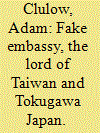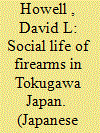| Srl | Item |
| 1 |
ID:
095356


|
|
|
|
|
| Publication |
2010.
|
| Summary/Abstract |
In 1624, the Dutch East India Company established a colony on Taiwan. When Dutch authorities moved to tax and restrict Japanese traders, who had been sailing to the island for a number of years, they encountered immediate resistance spearheaded by Suetsugu Heiz?, a Nagasaki official and merchant heavily invested in the Taiwan route. As part of his struggle against the Dutch, Heiz? attempted to drag the Japanese state into the conflict by engineering a fake embassy formed of 16 aboriginal men recruited from a village in Taiwan and transported to the center of Tokugawa power in Edo. This paper explores the embassy and uses it to consider why powerful Asian states like Tokugawa Japan displayed so little interest in overseas expansion, creating a vacuum of power that European overseas enterprises rushed enthusiastically to fill.
|
|
|
|
|
|
|
|
|
|
|
|
|
|
|
|
| 2 |
ID:
172859


|
|
|
|
|
| Summary/Abstract |
This article explores the thoughts and ideas associated with magic-lantern technology in late eighteenth- and early nineteenth-century Japan. Its primary focus is on trends in Japanese thought from the 1770s until the 1820s, with specific reference to the Rangaku (‘Dutch Studies’) movement. The article examines connections between the magic lantern and a wider discourse within Japan on epistemology, knowledge about nature, and the study of the human body, centring upon the device's vital role in the endeavour to understand the workings of the human eye. Through this lens, a fresh perspective is offered on the role of critical analysis in the translation and interpretation of European texts in Tokugawa Japan, as well as on the shifting prominence of empiricism and deductive reasoning in Japanese epistemology. In this way, the history of the magic lantern is used to look beyond the prevailing West-centred narrative of global technological and intellectual development.
|
|
|
|
|
|
|
|
|
|
|
|
|
|
|
|
| 3 |
ID:
088117


|
|
|
|
|
| Publication |
2009.
|
| Summary/Abstract |
Guns were surprisingly common in the villages of Tokugawa Japan. This article examines the 'social life' of firearms, focusing particularly on the hinterland of Edo. It traces the evolution of institutions governing peasants' possession of guns and examines prevailing conceptions of the uses of firearms. Building on the work of Tsukamoto Manabu, it argues that for much of the period guns were perceived to be farm implements rather than weapons per se: they were used to frighten or kill animals that damaged crops but not in conflicts among people. Starting in the 1840s, however, guns came to acquire an unequivocal character as weapons. This transformation came in response to anxiety over the proliferation of masterless samurai, unregistered commoners, and other disorderly elements, whose activities were seen as undermining the fabric of rural society.
|
|
|
|
|
|
|
|
|
|
|
|
|
|
|
|